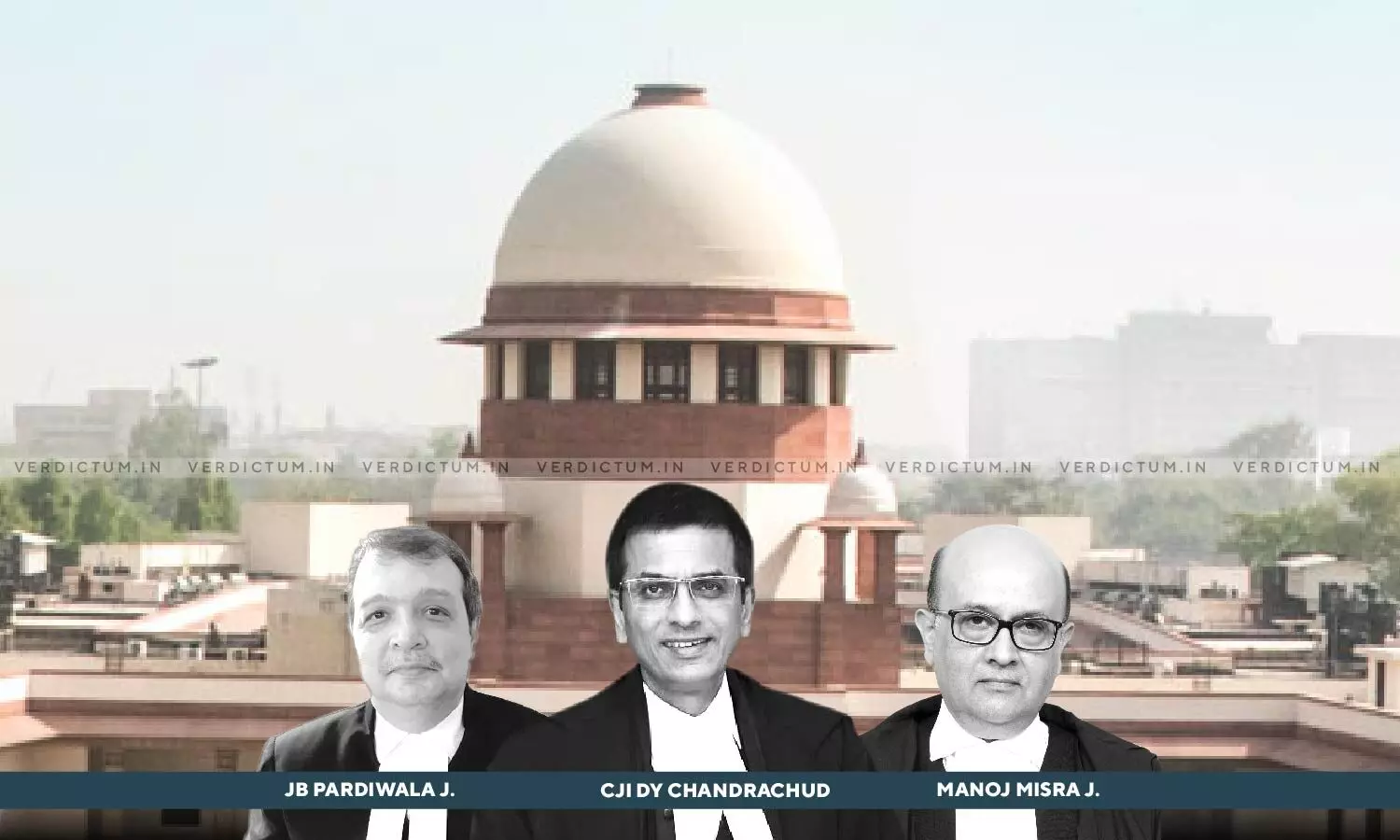
"3 Years Is An Unduly Long Period": SC Urges Parliament To Bring Amendment Prescribing Specific Limitation Period For Filing Application For Arbitrator Appointment
 |
|The Supreme Court observed that the period of three years is an unduly long period for filing an application for appointment of arbitrator under Section 11 of the Arbitration and Conciliation Act.
The Court suggested that Parliament should bring an amendment to the Act, 1996 prescribing a specific period of limitation within which a party may move the court for making an application for appointment of arbitrators.
In that context, the Bench of Chief Justice DY Chandrachud, Justice JB Pardiwala and Justice Manoj Misra observed that, "this Court while dealing with similar issues in many other matters has observed that the applicability of Section 137 to applications under Section 11(6) of the Act, 1996 is a result of legislative vacuum as there is no statutory prescription regarding the time limit. We would again like to reiterate that the period of three years is an unduly long period for filing an application under Section 11 of the Act, 1996 and goes against the very spirit of the Act, 1996 which provides for expeditious resolution of commercial disputes within a time-bound manner. Various amendments to the Act, 1996 have been made over the years so as to ensure that arbitration proceedings are conducted and concluded expeditiously. We are of the considered opinion that the Parliament should consider bringing an amendment to the Act, 1996 prescribing a specific period of limitation within which a party may move the court for making an application for appointment of arbitrators under Section 11 of the Act, 1996."
Counsel R Sathish appeared for the petitioner, while Senior Counsel Rana Mukherjee appeared for the respondents.
The petitioner, based in Afghanistan, engaged in providing computer education, information technology, and English language training, entered into three franchise agreements with the Mumbai-based respondent, which offered similar services. These agreements granted the petitioner-franchisee a non-exclusive license to operate under three trade names. Subsequently, the respondent submitted a proposal to the Indian Council for Cultural Relations for a short-term course, which the petitioner executed at its Kabul center. Disputes arose over royalty fees and agreement renewals. In 2018, the respondent issued a recovery notice for unpaid fees, leading the petitioner to decide not to renew the franchise agreements.
In 2021, three years later, the petitioner raised the issue of non-payment through a legal notice. After unsuccessful pre-institution mediation before the Bombay High Court, the petitioner sent an arbitration invocation notice to the respondent in 2022. The respondent, in their reply, denied all claims, citing a limitation bar. When the respondent failed to nominate an arbitrator as per the agreed-upon procedure, the petitioner initiated proceedings before the Supreme Court in 2023.
The Apex Court observed that while considering the issue of limitation in relation to a petition under Section 11(6) of the Act, 1996, the Court should satisfy themselves on two aspects by employing a two-pronged test – first, whether the petition under Section 11(6) of the Act, 1996 is barred by limitation; and secondly, whether the claims sought to be arbitrated are ex-facie dead claims and are thus barred by limitation on the date of commencement of arbitration proceedings. With that background, it was held that if either of the issues were answered against the party seeking referral of disputes to arbitration, the Court may refuse to appoint an arbitral tribunal.
It was noted that, "The present arbitration petition having been filed within a period of three years from the date when the respondent failed to comply with the notice of invocation of arbitration issued by the petitioner is not hit by limitation. The notice for invocation of arbitration having been issued by the petitioner within a period of three years from the date of accrual of cause of action, the claims cannot be said to be ex-facie dead or time-barred on the date of commencement of the arbitration proceedings."
Subsequently, the petition was allowed.
Appearances:
Petitioner: Counsel R Sathish
Respondent: Senior Counsel Rana Mukherjee
Cause Title: M/s Arif Azim Co. Ltd. vs M/s Aptech Ltd.
Click here to read/download the Judgment